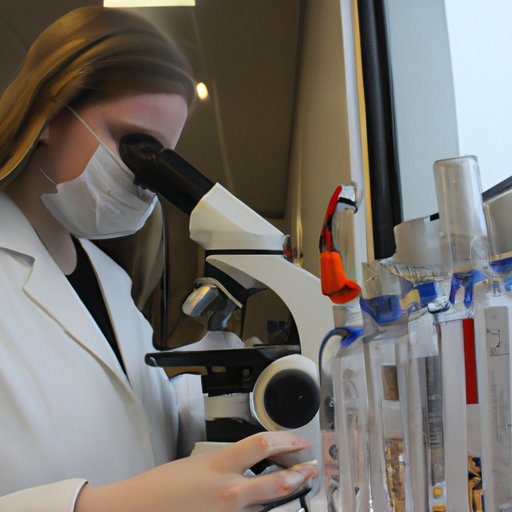Introduction
A biomedical science degree is an undergraduate or postgraduate degree that focuses on studying the human body and its functions. It covers a wide range of topics, including anatomy, physiology, biochemistry, molecular biology, pharmacology, and pathology. With a biomedical science degree, you can pursue a variety of careers in the medical field, such as research, teaching, and clinical practice.
The benefits of pursuing a biomedical science degree are numerous. Not only will you gain a comprehensive understanding of the human body and its functions, but you will also have the opportunity to explore a variety of career paths. Additionally, you will be able to take advantage of networking opportunities, develop your skillset, and increase your earning potential.

Exploring Career Paths in Biomedical Science
Biomedical science graduates have the opportunity to pursue a variety of career paths. For instance, they can work as researchers in academic, industrial, or governmental settings. They may also work as clinicians, providing patient care in hospitals, clinics, and other healthcare facilities. Other possible job titles include laboratory technicians, data analysts, and medical writers.
Biomedical science degrees also open the door to a variety of industries and fields, such as healthcare, pharmaceuticals, biotechnology, and research. These industries offer a variety of opportunities for biomedical science graduates, including research, development, and administration roles. Furthermore, these industries require individuals with advanced knowledge of the human body and its functions, which makes a biomedical science degree essential.

Networking Opportunities for Biomedical Science Graduates
In addition to exploring career paths, biomedical science graduates can take advantage of networking opportunities. Professional organizations, such as the American Society for Biochemistry and Molecular Biology (ASBMB) and the American Association for Clinical Chemistry (AACC), provide members with access to conferences and events, educational resources, and job postings. Joining these organizations is a great way to stay up-to-date on the latest developments in the field and network with peers.
Furthermore, connecting with alumni networks is another great way to network and find potential job opportunities. Alumni networks provide an opportunity to connect with professionals who have experience in the field and can provide valuable insight into the job market. Additionally, they can help you make connections and build relationships with potential employers.
Tips for Applying to Graduate Programs in Biomedical Science
If you’re interested in pursuing a graduate degree in biomedical science, there are a few tips to keep in mind. First, it’s important to understand the requirements for admission. Most programs require applicants to have a bachelor’s degree in a related field and a minimum GPA. Additionally, some programs may require additional materials, such as letters of recommendation and a statement of purpose.
Once you’ve familiarized yourself with the application process, it’s important to begin preparing for interviews. Most graduate programs require applicants to complete an in-person or virtual interview. During the interview, you should be prepared to discuss your research experience, interests, and goals. Additionally, it’s important to stay up-to-date on current issues and trends in the field.
Preparing for the Job Market with a Biomedical Science Degree
For those who are interested in working in the biomedical sciences after graduation, it’s important to begin preparing for the job market. This includes building your resume, crafting a cover letter, and developing your interviewing skills. Your resume should highlight your relevant experience and skills, while your cover letter should explain why you’re the ideal candidate for the position. Additionally, it’s important to practice your interviewing skills so that you can present yourself confidently and professionally.
Benefits of Pursuing a Biomedical Science Degree
Pursuing a biomedical science degree provides a number of benefits. One of the biggest advantages is the potential for increased earning power. According to the U.S. Bureau of Labor Statistics, biomedical scientists earn an average of $85,000 per year. Additionally, pursuing a biomedical science degree can lead to professional development and career advancement opportunities.

Research Opportunities for Biomedical Science Majors
Another benefit of pursuing a biomedical science degree is the opportunity to participate in research. Many universities and research institutions offer internships, grants, and fellowships for biomedical science majors. These programs provide students with hands-on experience in their field and can lead to future employment opportunities.

How to Utilize Your Biomedical Science Degree in Different Industries
Biomedical science graduates can use their degree to pursue various career paths in different industries. In the healthcare industry, biomedical science graduates can work in clinical care, research, and administration. In the pharmaceutical industry, biomedical science graduates can work in drug development and regulatory affairs. Finally, in the biotechnology industry, biomedical science graduates can work in research and development.
Conclusion
A biomedical science degree provides a wealth of opportunities for graduates. From exploring career paths to taking advantage of networking opportunities, there are a variety of benefits to pursuing a biomedical science degree. Additionally, biomedical science majors can participate in research opportunities, utilize their degree in different industries, and prepare for the job market. Ultimately, a biomedical science degree is a great choice for those who want to pursue a rewarding and fulfilling career in the medical field.
(Note: Is this article not meeting your expectations? Do you have knowledge or insights to share? Unlock new opportunities and expand your reach by joining our authors team. Click Registration to join us and share your expertise with our readers.)
